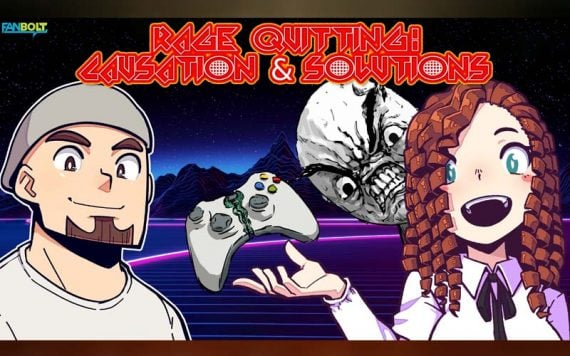Rage Quitting: Causation & Solutions

Everyone remembers their first incident of rage quitting. Some throw their controllers across the room. Others may engage in a loud and elongated tantrum packed with colorful epithets. For me? Well, a particular Batman game led to the Gameboy’s screen meeting my knee on several occasions until it was cracked and bleeding. While single player games can lead to instances of rage quitting, my personal experiences have shown that multi-player games have more control over our self-regulation.
Sometimes a challenge can turn gaming from an enjoyable hobby to an emotional tragedy, but why? To answer this question, we turn to researcher Platinum Paragon and her new article “The Psychology of Rage Quitting.” Platinum reviewed several studies that spanned decades, which directly and indirectly related to the art of gaming.
When comparing the joy of winning and the devastation of losing, we feel the effects of losing twice as hard as the joy of winning (Tversky & Kahneman, 1992). In fact, we may become anxious at the thought of losing again as we do not wish to relive the torrent of frustration and negative emotions (Rick, 2011). This results in what is known as loss aversion.
Loss aversion (Kahneman & Tversky, 1979) refers to our desire to avoid losing wherever possible. When it comes to video games, we risk losing something of value in the game (e.g. points) and risk the deterioration of our mental state. Rage quitting is the perfect loss aversion measure: it prevents us losing any of our in-game currency, and it prevents us from feeling frustrated at the loss of said currency.
Someone who has rage quit once may continue to do so through negative reinforcement (Skinner, 1938). To summarise negative reinforcement, something bad will not happen if someone continues to do something. If someone continues to rage quit when they’re about to lose, they never have to lose their points or mourn the loss of their points. There is also emerging evidence of a genetic basis to loss aversion (Voigt et al., 2015), so people may be genetically predisposed to rage quitting to protect their in-game points.
There are times when we just need a win, whether for personal fulfillment or as part of a competition. How to deal with a loss may simply come down to one’s core principles. A long time ago I learned to see a failure as a learning potential. It is OK to walk away from a game for a bit, allow your head to clear, try a different game and then come back to competitive play with a new perspective:
Advice for gamers on how to minimise rage quitting includes: taking a fun or relaxing break to re-energise yourself; realising the value of losing as an educational tool that helps you improve at the game; and remembering the wonderful things that make you who you are – you are more than winning or losing at a game.
Advice for game developers on how to minimise rage quitting involves writing messages in loading screens to help influence players’ behaviour (‘priming’). These messages can include: raising awareness of a healthy winning mindset via players who are paid to play the game around the world; raising awareness of community pages as a source of support and friendship; and raising awareness of rage quitters as cheaters and questioning the moral integrity of players.
Be sure to check out Platinum Paragon’s entire article here.


Responses